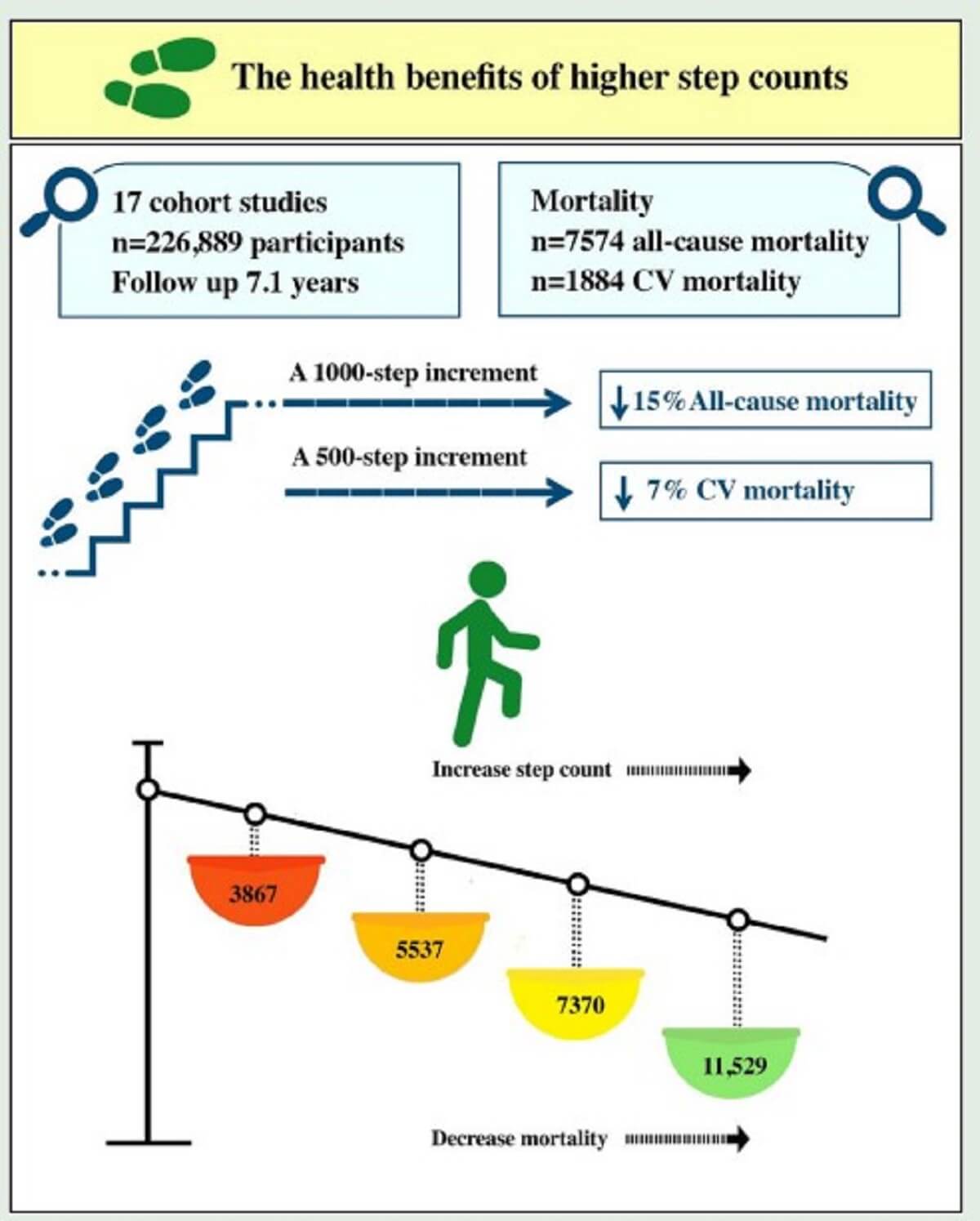LODZ, Poland — Taking a mere 4,000 steps a day can enhance one’s longevity and reduce the risk of cardiovascular disease, a new study explains. The research reveals that individuals who took at least 3,967 steps every day exhibited a lower chance of death from all causes. Furthermore, a daily step count of just 2,337 still displayed a link to a decreased likelihood of succumbing to heart disease.
After examining data from 226,889 participants across 17 studies, an international team found that every addition of 1,000 daily steps decreased a person’s death risk by 15 percent. Moreover, adding just 500 steps daily could lead to a seven-percent drop in mortality from cardiovascular ailments.
Interestingly, the researchers have yet to determine an upper limit; even those taking 20,000 steps daily continued to reap significant health benefits.
The benefits of walking appeared most pronounced among individuals younger than 60 years of age. Young adults, in the range of 7,000 to 13,000 steps daily, witnessed a striking 49-percent drop in their risk of premature death. This study was conducted collaboratively by researchers from Johns Hopkins University School of Medicine and the Medical University of Lodz in Poland. For seniors taking between 6,000 and 10,000 steps daily, the risk diminished by 42 percent.

shorten the lifespan. However, the optimal number of steps, both the cut-off points over which we can see health benefits, and the upper limit (if any), and their role in health are still unclear.
(credit: Banach et. al.)
“Our study confirms that the more you walk, the better,” says Professor Maciej Banach, the lead researcher and a cardiologist at the Medical University of Lodz, in a media release. “We found that this applied to both men and women, irrespective of age, and irrespective of whether you live in a temperate, sub-tropical or sub-polar region of the world, or a region with a mixture of climates.”
Further research is still necessary to explore the potential benefits of intensive physical exertions, such as marathon running or iron man challenges, especially among diverse age groups and health conditions.
“In addition, our analysis indicates that as little as 4,000 steps a day are needed to significantly reduce deaths from any cause, and even fewer to reduce deaths from cardiovascular disease,” adds Prof. Banach. “In a world where we have more and more advanced drugs to target specific conditions such as cardiovascular disease, I believe we should always emphasize that lifestyle changes, including diet and exercise, which was a main hero of our analysis, might be at least as, or even more effective in reducing cardiovascular risk and prolonging lives.”

The sedentary lifestyles many adopt are closely linked to elevated cardiovascular disease risks. Research indicates that one-fourth of the global population remains insufficiently active. A third of women, compared to 23 percent of men, are particularly inactive. Individuals from wealthier nations tend to be less physically active, with 37 percent not meeting recommended activity levels, as opposed to 16 percent in less affluent countries.
According to data from the World Health Organization (WHO), lack of physical activity ranks as the fourth leading cause of death globally, with approximately 3.2 million annual deaths attributed to physical inactivity. Notably, physical activity levels haven’t rebounded since the start of the COVID-19 pandemic.
“Until now, it’s not been clear what is the optimal number of steps, both in terms of the cut-off points over which we can start to see health benefits, and the upper limit, if any, and the role this plays in people’s health,” says Dr. Ibadete Bytyçi, a senior author of the study from the University Clinical Centre of Kosovo.
The researcher adds a note of caution, emphasizing the limited data available for step counts exceeding 20,000 daily and the need for further studies. The research team devoted seven years to monitoring participants, with an average participant being 64 years-old and 49 percent being female.
The study is published in the European Journal of Preventive Cardiology.
You might also be interested in:
- Simply wearing a fitness tracker boosts step counts — even if you never look at it
- Best Fitness Trackers For 2023: Top 5 Wearable Tech Devices Recommended By Experts
- Forget 10,000: Every 500 steps seniors take reduces their risk of heart problems
South West News Service writer Pol Allingham contributed to this report.

